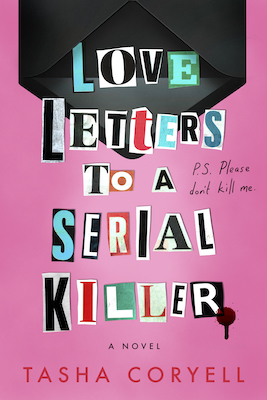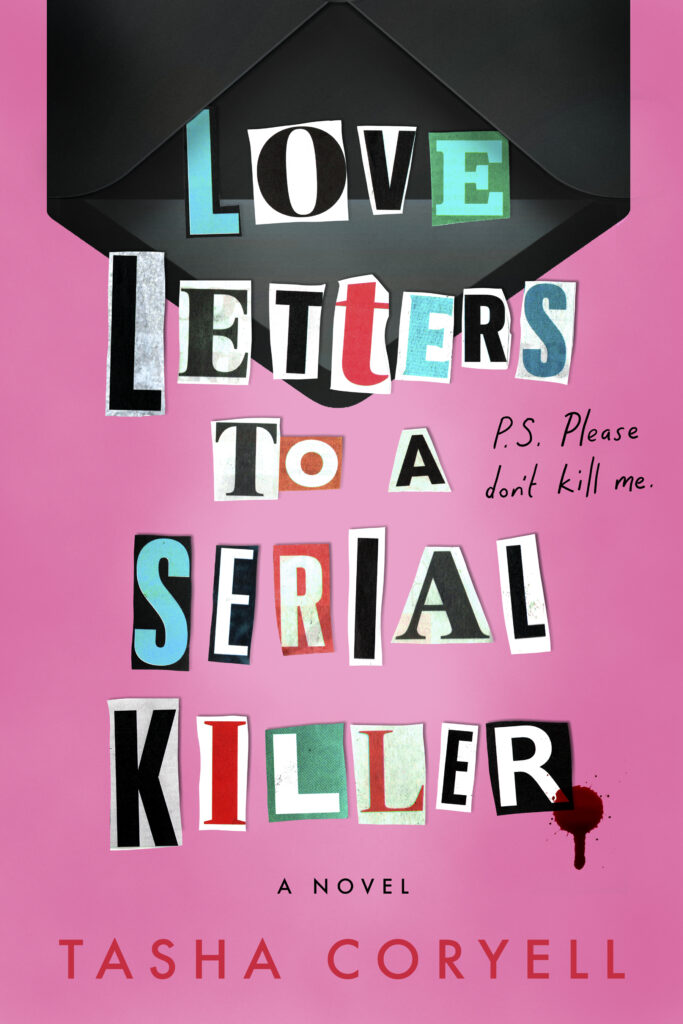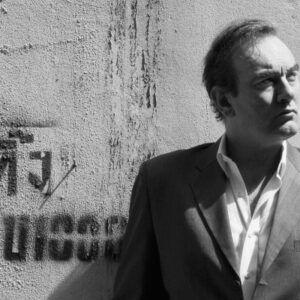
There was a drought in letters from William after I sent him the pictures of myself. I stared at my reflection in the mirror in the mornings and wondered what was so awful about my face that even an incarcerated serial killer didn’t want to talk to me. I looked at the digital versions of the pictures I’d sent him again and again, trying to detect what it was that turned him off of me. I attended my monthly dinner with my parents with a gaping wound on my face from where I picked at a zit until it turned into a sore.
“What happened?” my mother asked, glancing at my forehead as I got into the car.
“I bumped into a door,” I lied, embarrassed by my own skin‑picking.
I’d made reservations at one of my favorite restaurants that I couldn’t afford to eat at when I was the one paying. It existed in a strange realm of spaces that I’d only been to with potential love interests and my parents.
“How’s work going?” my dad asked.
He was on the verge of retirement. So much of his life was dedicated to his job that I wasn’t sure how I was going to conceptualize him without it.
My parents were good parents, but they don’t understand what it’s like to be a person right now, I told William.
“It’s good. We had our most successful gala fundraiser in history,” I said, omitting the fact that I’d been put on probation because I spent too much time at work obsessing over an accused serial killer.
They never insulted me. Instead, they crushed me with the size of their expectations. When I was a child, they thought I was a genius. If I got lower than an A on anything, they asked me what was wrong and said that I wasn’t performing up to my potential. They wouldn’t listen when I explained that sometimes I could put all my effort into something and still only get a B. They always told me that I would do great things and what am I doing? Working in communications at a nonprofit that doesn’t appreciate me. Nothing I say can make them see the reality of my life.
“That’s great. Any chance of a raise?” my dad asked.
I took a sip of the expensive cocktail that I ordered. I wished it were bigger.
“Maybe next year!” I said in my most cheerful voice.
They think things still work the way that they did when they were in their thirties. They ask me about raises, promotions, and how many vacation days I get a year as though I can afford to take a vacation. My dad continually asks if I’ve paid off my student loans as though that will ever be a possibility. If only they understood all the things that are out of my reach.
“What about the novel you’re writing? Any progress on that?” my dad continued to press.
“Well, the creative process is complicated,” I started to say and was almost relieved when my mom interrupted me to ask whether I was dating anyone, her favorite line of inquiry.
“I would tell you if I was dating someone,” I lied. I could feel William’s letters in my purse that hung over the back of my chair. I wondered what my mom would do if I told her that I spent most of my time obsessing over an accused serial killer. How as we sat there in the restaurant, a part of me was still fixated on why he hadn’t written me back.
“I’m sorry for asking. In the past you haven’t always been transparent,” my mom said.
I rolled my eyes.
“I’m not going to tell you about every single person that I go on a date with. I promise that I’ll tell you if I get in a serious relationship with anyone.”
Our squabble further devolved as my mother pointed out how secretive I could be and how she wanted to know more about my life, which had been a point of contention between us for years. She wasn’t wrong; I did keep secrets from them. I found it mortifying to show my entire self to them and so I kept it all hidden, the boys that I dated, the music I listened to, the food that I ate, my performance at work. I couldn’t explain to my mother, who thought I was smart and beautiful, all the ways in which I debased myself on a regular basis.
“Let’s change the subject,” I said finally, and my father started talking about his retirement plans.
I ate too much and then ordered dessert because I didn’t want to miss out on an opportunity to indulge. The ice cream made my stomach hurt in a way that ice cream often did, something I conveniently forgot before ordering. Rather than soothe my emotions, the three cocktails I drank made everything feel heightened. The zit on my forehead suddenly a mountain.
“You seem cranky,” my mother said when we walked back to the car.
“I’m not,” I said crankily. “Just tired.”
There won’t be a letter, I told myself in the car. To hope for a letter would be to set myself up for disappointment and I already felt so thoroughly crushed. What if, a tiny voice said, there’s a letter? No. There would be no more letters. Besides, what did it matter? He was a serial killer. Not someone worthy of love.
I stomped into the foyer of my building, preemptively angry about the emptiness of my mailbox. I tried to convince myself it was a trick of the light when I saw the edge of an envelope through the window. It took me several tries to input the correct combination for my mailbox. My fingers understood my drunkenness in a way that my brain never would. When I finally got it open, I ripped into the envelope, tearing the paper in the process.
Excerpt continues below cover.

Sorry for the delay in writing, William said. It took me a few days to articulate what I needed to say.
I forgave him immediately, though I’d been suffering in his absence and the self‑inflicted wound on my forehead pulsed as a reminder.
You’re really very beautiful, Hannah. I don’t know how I’ve found myself in this position of being locked in a jail cell with a beautiful girl writing to me. If there’s any brightness in the dark, it’s you. I hope you know that you deserve someone better than me.
Beautiful. My worm brain glommed on to the word and immediately, I went back and looked at the pictures that I’d sent him, pictures that hours ago I’d derided as ugly, and now, suddenly, I glowed.
I didn’t want to think of myself as susceptible to flattery, as I considered myself to be self‑aware, but it was possible that flattery influenced my decision more than I liked to admit. The first time I met Max at a party hosted by a friend of Meghan’s that she’d dragged me to, there was no part of me that considered him a potential love interest. For one, I didn’t find him especially attractive and two, he was a thirty‑year‑old man who still had a punk band. Late in the evening, we wound up sitting outside together smoking drunken cigarettes.
“You’re intimidating, you know that?” he said to me. I laughed. I was anything but.
“I’m serious,” he insisted. “You’re beautiful, you’re smart, you’re funny.”
I didn’t hesitate to give him my number when he asked, though I still had no intention of going out with him. He sent me texts for a couple of weeks, inviting me to this and that, until I finally agreed to meet up with him. Somewhere along the way, sex became implied within our conversation.
What an insult it was to discover that I liked him after all and that he was the one to insist that he didn’t want anything further from me. He’d called me intimidating, said I was beautiful, that he had to see me again. Such compliments were the only reason that I liked him to begin with and somehow, I was the one left destroyed.
I could see the pattern repeating itself when I read William’s letter.
Beautiful, it said.
The situation with William was different from the situation with Max because William was something worse than a thirty‑ year‑old with a punk band. William was a serial killer. And yet, my heart soared when I saw those words.
If there was any chance of turning back, it died that night. “Don’t become one of those women,” Meghan had said the last time we spoke. It was like she could smell it on me. Like “that woman” was a perfume that I sprayed on in the morning.
The letter I sent that night was the line in the sand. A before and after that I could point to between the time where I pretended that I still detested William as a killer and the acknowledgment of my love.
What I didn’t realize is that becoming one of those women wasn’t like getting hair dyed or nails painted and instead more like a tattoo, something that stains the skin irrevocably for everyone to see.
I wish you could’ve been at dinner with me tonight, I wrote.
I think about you all the time. I can’t explain it, I continued.
I don’t condone what you did, but everyone deserves a second chance, I said after foraging through my fridge for the remnant of a bottle of pinot grigio.
Why are you there for me more than anyone else in my life?
I was so lonely before I met you and we haven’t even met. I pondered as I finished my glass.
Is it weird to say that I wish we could hug?
Can you touch a woman without ending her life? I asked before crossing the line out and replacing it with the words “Love, Hannah.
__________________________________


